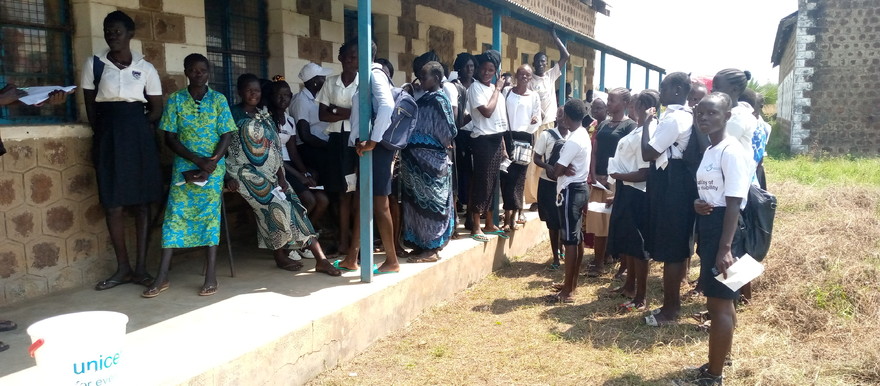Schoolgirls ranging from primary 5 to senior 4 in South Sudan’s Eastern Equatoria State started receiving Girls Education South Sudan (GESS) cash transfers on Wednesday.
The transfers are direct payments made to girls enrolled in and regularly attending school from Primary 5-8 and Secondary 1-4 over the lifetime of the program. Cash Transfers encourage girls to enroll in and attend school, help them to buy scholastic materials, and contribute to poverty reduction in the family and the community.
The distribution, done by the Adventist Development Relief Agency (ADRA), the implementing organization for GESS in Eastern Equatoria State targets 20,000 girls.
“We are here at Torit Day Secondary School for the girls' cash transfer 2020. The payment is scheduled to take place over three weeks all over Eastern Equatoria State because we have another team that went to Magwi, there is a team here (Torit) and another one to Kapoeta. The girls who are eligible to get this money are from primary 5 to senior 4 who are validated and have valid validation forms,” ADRA school base trainer Taban Paride Johnson said.
“Candidate classes get 8,250 SSP and lower classes or non-candidate classes receive 5,500 SSP. The use of this money is to help girls enroll in school, remain in school and complete their education and the purpose is to support them so that they don’t drop out,” Paride added.
He further blamed the coronavirus pandemic for a delay in the disbursement of the cash following the closure of schools as a measure to stop the spread of the virus.
According to Paride, candidate classes need a lot of requirements and need support to prepare themselves for final examinations. He urged them to refrain from using the money to buy unnecessary things such as Christmas clothes.
Rejoice Iholong James, a candidate at Torit Day Senior Secondary School confirmed that she received the money and said it will help her buy scholastic necessities.
“Am feeling so happy because this money will help us a lot as girls of South Sudan to buy some necessities like pens, books, school bags, school shoes, and sanitary pads. I expect girls to use the money the way it is supposed to be used, like for buying books. Those who are still in lower classes and those leaving school should buy sanitary pads and pants, things that can help,” she said.
Another pupil, Grace Ben, said that the money will keep girls in schools even in times of menstruation period.
“This money is going to help me in many ways to buy things I do not have like pens and books, some for sanitary pads and some things I need because this money is used to help girls stay in school instead of going home without attending lessons.”
Some schoolboys felt left out and neglected and said they should be treated equally as the girls.
Otok Ronald Khasmiro, a senior four pupil said, “Girls are receiving the money but our question is why are boys not receiving too? Some boys are not in school, I want it to be for both of us because we boys feel isolated. If they are receiving and we are not it means there is something hidden because if we look at the dropouts it is not only girls, there are boys in the streets."
Ohuru Filbert said many boys are not able to attend school for lack of fees.
He said, “some of us boys struggle to pay school fees by ourselves but if they could assist us with this money we will not waste time doing other things like boda-boda riders, wasting time at home, we would come to school.”
Imoya Jevnali Oduho, the senior teacher at Torit Day Secondary School fears that following up on the usage of the GESS money may not be possible because schools are not functional and worry that the girls might divert the money for Christmas spending and domestic needs due to the economic hardships.
“The challenge is that the money has been brought in the time of Christmas. These girls will now think of buying Christmas attires which will finish in time,” Imoya said. “There are parents who will intervene to buy flour due to poverty and since the schools are not functioning it becomes difficult to intervene as senior teachers to follow up with the girls.”




